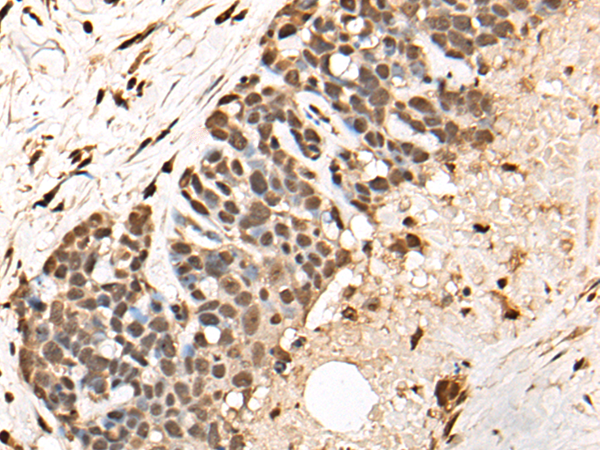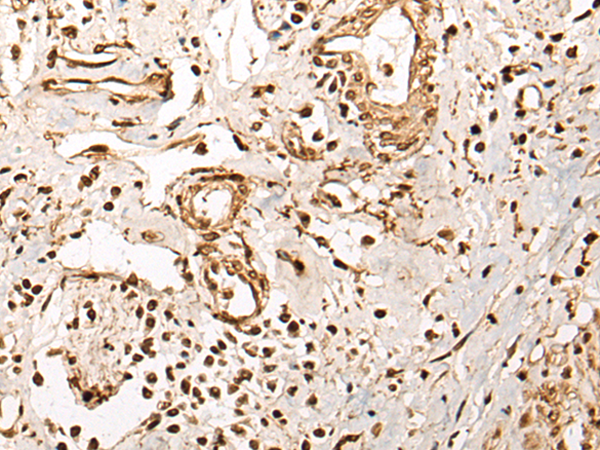

| WB | 咨询技术 | Human,Mouse,Rat |
| IF | 咨询技术 | Human,Mouse,Rat |
| IHC | 1/25-1/100 | Human,Mouse,Rat |
| ICC | 技术咨询 | Human,Mouse,Rat |
| FCM | 咨询技术 | Human,Mouse,Rat |
| Elisa | 1/5000-1/10000 | Human,Mouse,Rat |
| Aliases | LGS |
| Host/Isotype | Rabbit IgG |
| Antibody Type | Primary antibody |
| Storage | Store at 4°C short term. Aliquot and store at -20°C long term. Avoid freeze/thaw cycles. |
| Species Reactivity | Human, Mouse |
| Immunogen | Fusion protein of human BCL9 |
| Formulation | Purified antibody in PBS with 0.05% sodium azide and 50% glycerol. |
+ +
以下是3篇关于BCL9抗体的参考文献摘要概括:
---
1. **文献名称**: *Targeting BCL9/BCL9L Enhances Antitumor Activity of PD-1 Blockade in Colorectal Cancer*
**作者**: Zhang M, et al.
**摘要**: 该研究开发了一种靶向BCL9的单克隆抗体,发现其可通过抑制Wnt/β-catenin信号通路增强结直肠癌细胞对PD-1免疫检查点抑制剂的敏感性,联合治疗显著减少小鼠模型中肿瘤转移。
---
2. **文献名称**: *BCL9 Inhibition Induces Synthetic Lethality in Wnt/β-Catenin-Dependent Hepatocellular Carcinoma*
**作者**: Jiang Y, et al.
**摘要**: 研究利用人源化BCL9抗体阻断其与β-catenin的相互作用,证明在肝癌模型中可选择性抑制Wnt高活性肿瘤的生长,并增强标准化疗药物(如索拉非尼)的疗效。
---
3. **文献名称**: *BCL9 Antibody-Drug Conjugate Targets Cancer Stem Cells in Triple-Negative Breast Cancer*
**作者**: Li X, et al.
**摘要**: 通过构建BCL9靶向的抗体-药物偶联物(ADC),该研究在小鼠三阴性乳腺癌模型中有效清除肿瘤干细胞,抑制肿瘤复发,机制涉及下调Wnt靶基因如c-Myc和Cyclin D1.
---
以上文献均聚焦于BCL9抗体在肿瘤治疗中的应用,涵盖机制探索与临床前实验。如需具体期刊信息或发表年份,可进一步补充关键词检索。
The B-cell lymphoma 9 (BCL9) protein is a transcriptional coactivator that plays a critical role in the Wnt/β-catenin signaling pathway, a key pathway regulating cell proliferation, differentiation, and stemness. Dysregulation of this pathway is implicated in various cancers, including colorectal, hepatocellular, and hematologic malignancies. BCL9 interacts with β-catenin to enhance its nuclear translocation and transcriptional activity, driving the expression of oncogenes like c-Myc and cyclin D1. Elevated BCL9 expression is associated with tumor progression, metastasis, and poor prognosis.
BCL9 antibodies are tools developed to target this oncogenic mechanism. They aim to disrupt the BCL9-β-catenin interaction, thereby suppressing aberrant Wnt signaling. Preclinical studies show that inhibiting BCL9 with antibodies or small molecules reduces tumor growth and metastasis in animal models, particularly in cancers with hyperactive Wnt pathways. These antibodies also serve as research reagents to study BCL9's role in development and disease. However, challenges remain, including optimizing specificity, delivery efficiency, and addressing potential compensatory pathways. While still largely experimental, BCL9 antibodies represent a promising therapeutic strategy for Wnt-driven cancers, offering an alternative to conventional pathway inhibitors.
×